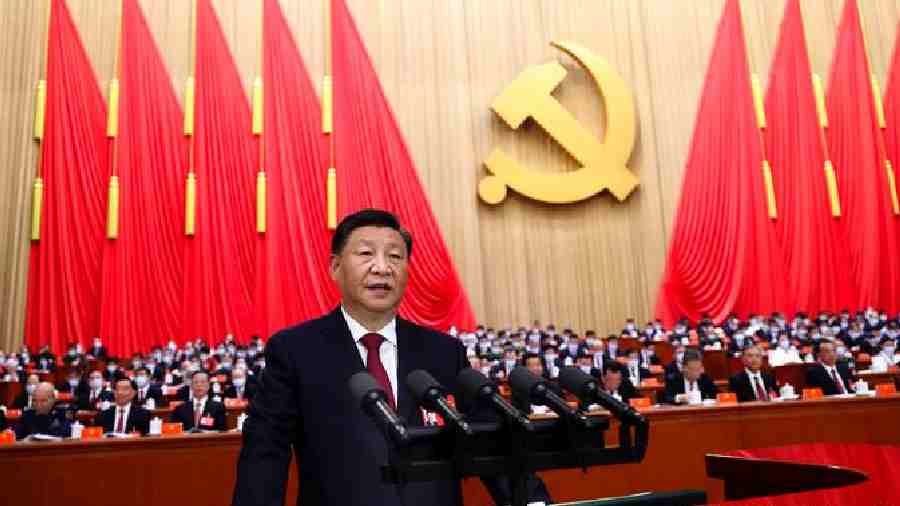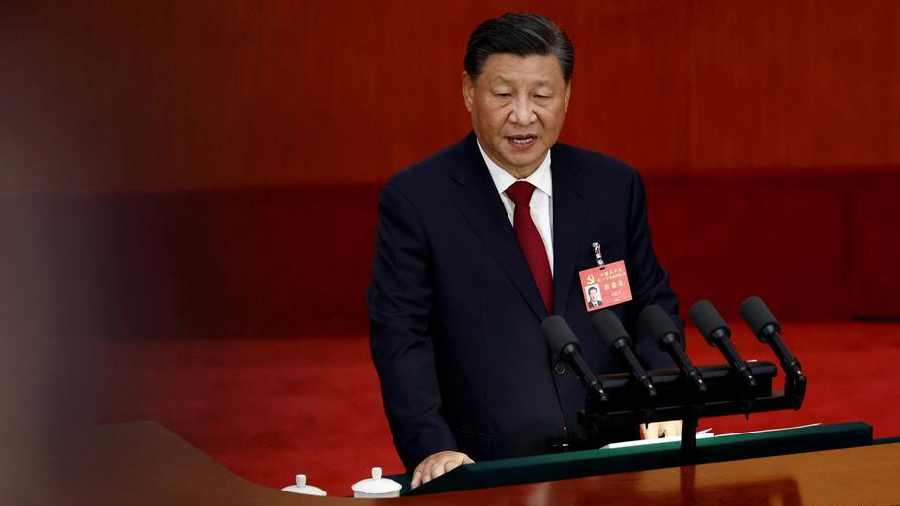On Sunday, President Xi Jinping struck a triumphant tone in his speech at the opening of the 20th National Congress of the Chinese Communist Party (CCP) by highlighting the party's achievements over the last five years. Additionally, Xi promised a series of reforms and changes that he hopes will direct China toward the goal of national rejuvenation.
Speaking in front of around 2,300 delegates in the Great Hall of the People, Xi defended the zero-COVID strategy, saying the pandemic control measures have "protected people's lives and health."
He also justified his hardline policies towards Hong Kong, saying the move to impose the "patriots rule" in the former British colony have helped turn the situation in Hong Kong from "chaos to governance."
Xi also said that while Beijing would strive for peaceful reunification with Taiwan, a self-ruled island that China views as its territory, it would never renounce the option of using force to achieve that goal. "The wheels of history are rolling on towards China's reunification and rejuvenation of the Chinese nation, and the complete reunification of the motherland must be achieved and can definitely be achieved," he affirmed.
Speech could have been more confrontational
Wen-Ti Sung, a lecturer in Taiwan Studies at the Australian National University (ANU) and currently based in Taipei, said Xi's speech is a lot less eslacatory compared to what some analysts might have been expecting. "He talks about the 'complete reunification of the motherland ought to happen' and 'must happen' but he is very vague on how he intends to make it happen," the lecturer told DW.
"While some Taiwanese observers fear Xi could be laying out specific new strategies to solve the Taiwan problem, Xi's speech signals a greater desire to hold onto continuity rather than change. He talked about firm resolve and strong capabilities to oppose Taiwan's independence, but he didn't talk about intent, plan, or timetable. The intent is to make it even more ambiguous as to the timeline and urgency of unification with Taiwan," he added.
Apart from emphasizing the CCP's success in overcoming challenges, Xi also highlighted "rapid changes in the international situation," praising the party's efforts to "uphold international fairness and justice, advocate the practice of genuine multilateralism, and clearly oppose all hegemonism and power politics."
As the geopolitical tension between China and the US-led Western countries rises, Ian Chong, a political scientist at the National University of Singapore (NUS), says the emphasis on multilateralism means China will continue to challenge and compete with the United States. "When talking about multilateralism, it often means Beijing will work through international institutions, notably UN agencies, to counter what it sees as US influence," he told DW.
Emphasis on ideology and self-reliance
While the speech is largely viewed as a continuation of the existing policies under Xi's rule over the last decade, Chong from the NUS says the Chinese leader's emphasis on discipline and ideology was notable. "One of the ways that Xi Jinping tries to deal with challenges, including the slowing economy and China's rivalry with the US, is to emphasize party discipline and ideology," he told DW.
During the speech, Xi described Marxism as the guiding ideology of the Chinese Communist Party, and that it's the "solemn historic responsibility" of the party's members to keep "opening new chapters in adapting Marxism to the Chinese context."
Laying out the vision for the next five years amid rising economic challenges, Xi said Bejing will continue to promote common prosperity, improve wealth distribution and accelerate the development of a housing system. He also highlighted the need for China to grow its economy through a socialist market economy and dual circulation strategies.
Seeking world-class education
Dexter Roberts, a senior fellow at the Atlantic Council, said Xi didn't offer more insights about the concept of "common prosperity" in his speech. "It has been a statement of purpose without a lot of information and there is not a lot of fleshing out about how they are actually going to do it," he told DW.
"I also think common prosperity has an element in the leadership and Xi's mind of punishing the rich people. A lot of the crackdowns on entrepreneurs and big tech companies in China have concerns about data and economic security," he added.
However, Iris Pang, the ING Group's chief economist for Greater China, thinks that Beijing is trying to rebrand common prosperity by highlighting the need for China to build world-class education. "I believe they are looking for world-class education, and this will provide opportunities for the younger generation to climb the wealth ladder and they have a channel to do that properly," she told DW.
And with the US increasing its efforts to prevent China from accessing critical semiconductor technologies, Xi promised to focus on "high-quality development" that would prioritize education, science, and technology. He said China would "accelerate the realization of a high level of scientific and technological self-sufficiency and self-improvement."
Roberts from the Atlantic Council says Xi's repeated emphasis on "self-reliance" shows Beijing wants to prove they can "go it alone" even though it may be challenging. "I don't think Xi realizes how difficult it would be for them to indigenize the high-tech side of their supply chain," he told DW.
Military modernization and strengthening security
Apart from becoming more self-reliant, Xi also stressed the importance of continuing the efforts of military modernization, pledging to accelerate the "modernization of military doctrine, the organization of the army, military personnel and weapons and equipment."
Xi underlined the importance of strengthening a wide range of "securities" in China, mentioning the word around 50 times throughout this speech. He urged China to strengthen the foundation of its national security while improving its early warning system and ensuring food and energy supplies.
David Bandurski, a co-director at the China Media Project (CMP), told DW that the concept of national security was one of the clearest signals in Xi's speech on Sunday. "It's a complete continuation from what we've seen under Xi," he said. "We can assume with some accuracy that they are talking about the United States, and some of it may be about domestic concerns about the security of development or employment."
Overall, some experts think Xi is ramping up the vision and direction that he's mapped out over the last decade through the speech. Holly Snape, an expert on Chinese politics at the University of Glasgow, told DW that instead of setting new goals, Xi's speech doubles down on a narrow vision of "party-defined modernization."
Shaping history to lay out the future
"It's important that Xi headed drafting, as it enabled Xi to deepen and consolidate thinking he began to set out, especially in 2017," she said.
Bandurski from CMP adds that the political report that Xi delivered on Sunday is mainly to signal his power and position him within the CCP's history. "History is always right in front of the CCP, and interpreting history and expanding history is really key to signaling power for Xi," he told DW. "Everything is about telling the basic story, which is that the last five years have been a great success and here's why."
The twice-a-decade congress will last about a week and Xi is expected to secure an unprecedented third term by the summit. Apart from that, the CCP will also unveil the lineup of its new leadership at the summit's conclusion.











